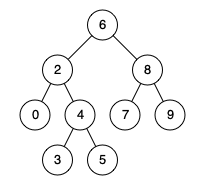..
235. Lowest Common Ancestor of a Binary Search Tree
Problem Description
Given a binary search tree (BST), find the lowest common ancestor (LCA) of two given nodes in the BST.
According to the definition of LCA on Wikipedia: “The lowest common ancestor is defined between two nodes p and q as the lowest node in T that has both p and q as descendants (where we allow a node to be a descendant of itself).”
Example 1:

Input: root = [6,2,8,0,4,7,9,null,null,3,5], p = 2, q = 8
Output: 6
Explanation: The LCA of nodes 2 and 8 is 6.
Example 2:

Input: root = [6,2,8,0,4,7,9,null,null,3,5], p = 2, q = 4
Output: 2
Explanation: The LCA of nodes 2 and 4 is 2, since a node can be a descendant of itself according to the LCA definition.
Example 3:
Input: root = [2,1], p = 2, q = 1
Output: 2
Constraints:
The number of nodes in the tree is in the range [2, 105].
-10^9 <= Node.val <= 10^9
All Node.val are unique.
p != q
p and q will exist in the BST.
Solution
Using attribute of Binary Search Tree to do Divide and Conquer
Python
# Definition for a binary tree node.
# class TreeNode:
# def __init__(self, x):
# self.val = x
# self.left = None
# self.right = None
class Solution:
def lowestCommonAncestor(self, root: 'TreeNode', p: 'TreeNode', q: 'TreeNode') -> 'TreeNode':
if not root or not p or not q:
return None
return self._findLCA(root, p, q)
def _findLCA(self, root, p, q):
if root == p or root == q:
return root
if root.val < p.val and root.val < q.val:
return self._findLCA(root.right, p, q)
elif root.val > p.val and root.val > q.val:
return self._findLCA(root.left, p, q)
else:
return root
Java
/**
* Definition for a binary tree node.
* public class TreeNode {
* int val;
* TreeNode left;
* TreeNode right;
* TreeNode(int x) { val = x; }
* }
*/
class Solution {
public TreeNode lowestCommonAncestor(TreeNode root, TreeNode p, TreeNode q) {
if (root == null || p == null || q == null) {
return null;
}
return findLCA(root, p, q);
}
private TreeNode findLCA(TreeNode root, TreeNode p, TreeNode q) {
if (root == null) {
return root;
}
if (root == p || root == q) {
return root;
}
if (root.val < p.val && root.val < q.val) {
return findLCA(root.right, p, q);
} else if (root.val > p.val && root.val > q.val) {
return findLCA(root.left, p, q);
} else {
return root;
}
}
}
Complexity Analysis
- Time Complexity
- O(H), where H is the height of Binary Search Tree
- Worst case: O(n)
- Average case: O(logn)
- O(H), where H is the height of Binary Search Tree
- Space Complexity
- O(1)